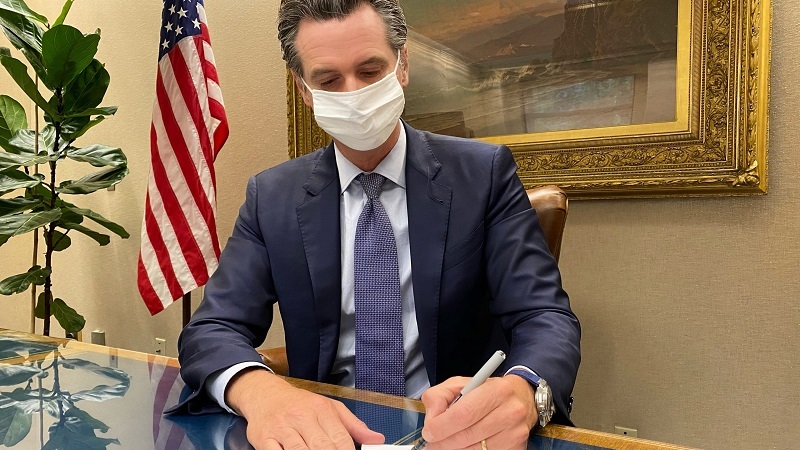California Gov. Gavin Newsom signing the 2020 budget last summer. | gov.ca.gov
California Gov. Gavin Newsom signing the 2020 budget last summer. | gov.ca.gov
Phill Kline, the former Republican attorney general of Kansas, doesn’t have a position on the California recall election. It’s the sanctity and security of the ballot that has him raising questions.
“I’m not a Californian,” Kline said. “I'm not out there. I'm not voting in it. I’m clear out on the East Coast.”
But the former Kansas attorney general, who now leads The Amistad Project, which promotes itself as the nation’s leading election integrity watchdog, said there are mail-in ballots in California that could allow poll workers — or anyone else with access to them — to see how the person voted.

Phill Kline of The Amistad Project.
| The Amistad Project
A recall election on California Gov. Gavin Newsom is set for Tuesday, Sept. 14. The process began in June 2020 and after several failed efforts, resulted in more than 1.7 million valid signatures being processed by the California Secretary of State’s Office.
An Instagram video posted by Amy Cox sparked controversy when she alleged that two holes in the envelope for recall ballots could allow anyone to see whether the voter was for or against recalling Newsom.
The video gathered much attention online and spawned concerns about the integrity of the election, citing the possibility of election workers screening ballots before counting them.
State officials have defended the design, saying the holes serve two legitimate purposes. First, they provide guidance to blind voters to fill out their ballot. Second, they allow election workers to quickly confirm that an envelope is indeed empty before discarding it and moving on.
Kline said he was at first alarmed by what he considers “negligent” ballot design and that the matter was brought to his attention recently.
“I heard from the American Voters Alliance that there were holes in the ballots that just happened to reveal the vote of those who had cast ballots,” Kline said. “One of the things that Amistad is concerned about is this nonprofit infrastructure that's actually determining the election policy in the nation, that this decision to put those holes there might be as a result of advice from those groups.”
He said the ballots could be spoiled by this flaw. Kline rejects the ballots were merely crafted to aid voters who are visually impaired, noting there are other, better options.
“I would also ask them if there are alternatives that would assist those with visual impairment. And the answer is yes,” Kline said. “All you need is a privacy sleeve. If you have a privacy sleeve, you can have the holes there, they can see that there's something in the envelope and the visually impaired can touch those holes. “The reality is they have they have compromised something very important in an election, for a fix that has alternatives to it that would not result in invading the privacy of the voter or subject ballots to spoiling by third parties.”
He said although some have argued the ballots were only distributed in Los Angeles County, they were in fact used in several counties. Jacqueline Timmer, the founder of the American Voters Alliance, and Kline’s daughter, is studying the matter.
“I think it's up to four,” Kline said. “I'm not going to imply anything by this. But what they have now are different ballot designs, different sizes, different folding, different envelopes, all the votes in multiple counties, multiple, meaning at least three. Coincidentally or intentionally, when you fold that ballot and put it in the envelope, the holes correspond with the ability to see how you voted on recalling the governor.”
He said he is not leveling any accusations.
“I'm just speaking facts of what it is," Kline said. "I'm not speaking to intent. I would need to know more. I just know that this is a flawed approach to assisting the visually impaired in their voting.”
Kline, 61, is a former Republican state representative and attorney general of Kansas, a post he held from 2003-07. He served as chair of the Republican Attorneys General Association and president of the Midwest Association of Attorneys General.
Kline, who has successfully argued before the U.S. Supreme Court, moved to Virginia in 2009.
The Amistad Project is named for the slave ship La Amistad, upon which Africans being taken from Spanish-controlled Cuba to the United States in 1839 staged a rebellion, killing the captain and some of the crew.
In the end, 35 of the Africans, including their leader, Joseph Cinqué, were able to return to their native country, which is now Sierra Leone. The story was told in an acclaimed 1997 film directed by Steven Spielberg starring Anthony Hopkins, Morgan Freeman, Matthew McConaughey and Djimon Hounsou.
Kline said he chose the name to honor “any endeavor to do what is right and what is good,” since that is not limited by time.



 Alerts Sign-up
Alerts Sign-up